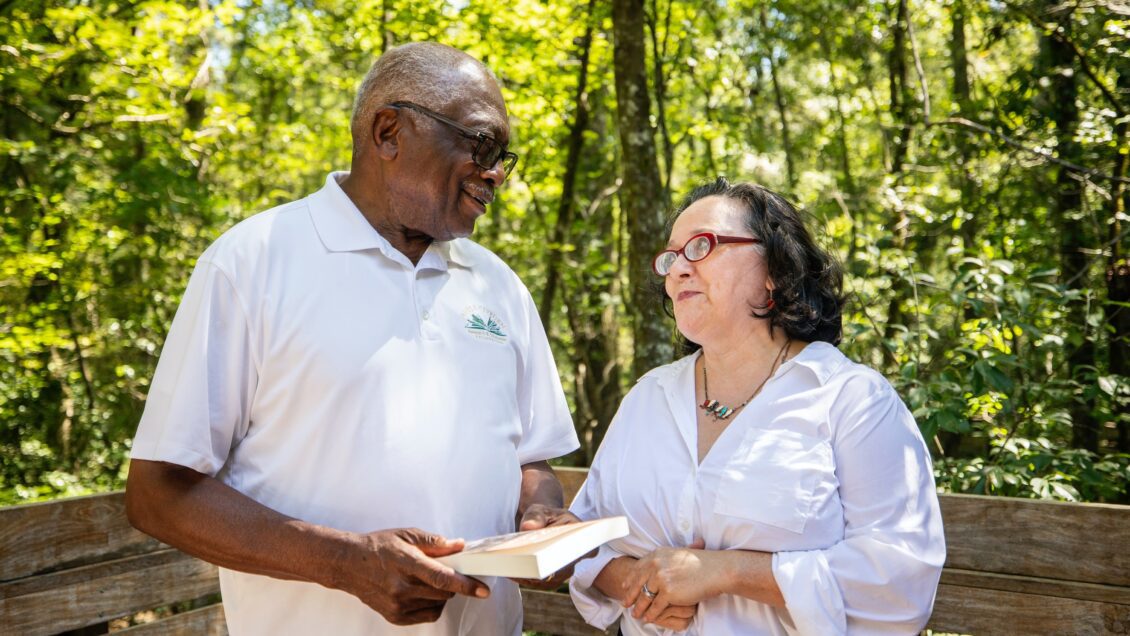A previously overlooked stop on the Underground Railroad has been recognized by the National Park Service thanks in part to the scholarship of Professor Susanna Ashton in Clemson University’s Department of English.
On September 16, U.S. Representative James E. Clyburn (SC-06) joined Ashton and representatives from Audubon South Carolina and the National Park Service at Audubon’s Center and Sanctuary at Francis Beidler Forest to commemorate the designation of Four Holes Swamp as part of the National Underground Railroad Network to Freedom program. Four Holes Swamp — a blackwater tributary to the Edisto River — contains Beidler Forest, which hosts the largest stand of virgin bald cypress trees anywhere on earth and serves as a sanctuary to more than 140 species of birds.
The Network to Freedom program, which is an initiative of the National Park Service, “honors, preserves and promotes the history of resistance to enslavement through escape and flight, which continues to inspire people worldwide.”
Audubon South Carolina’s effort to have the site’s historical significance recognized was sparked by Ashton’s work. Her research into the stories of enslaved people led her to identify the author of the anonymous “Recollections of Slavery by a Runaway Slave” as James Matthews of Dorchester County, South Carolina.
“I tracked his experiences escaping from bondage and, astoundingly, making his way to freedom in Maine,” she explained.
Matthews’ quest for freedom began in Four Holes Swamp, where he was born and where he took refuge after fleeing enslavement at a nearby plantation. In spring 2023 Ashton, along with the Avery Research Center, helped Audubon create new interpretive signs about Matthews’s story and the experience of other fugitive communities in this environment. Four Holes Swamp is now one of nine sites in South Carolina recognized by the Network to Freedom Program.
Seeing Audubon’s Francis Beidler Forest now officially recognized as a freedom site helps us expand our understanding of the word, ‘sanctuary.’
Professor susanna Ashton, Clemson University Department of English
Ashton shared the stage with Rep. Clyburn and other leaders at the celebration of the site’s designation, which occurred during International Underground Railroad Month.
“The stories of the men and women who sought freedom from enslavement among these very trees are powerful reminders of the strength and resilience of the human spirit, even under the most challenging circumstances,” Clyburn said.
“Seeing Audubon’s Francis Beidler Forest now officially recognized as a freedom site helps us expand our understanding of the word, ‘sanctuary,'” Ashton said. “I was thrilled to be part of that process to get the forest recognized and delighted to be part of new interdisciplinary conversations about how preserving our environment for wildlife also allows us to preserve our environment for reckoning.”
In addition to its historical significance, Four Holes Swamp also provides vital habitat for vulnerable bird and wildlife species. It also has a critical ecological role the Lowcountry, maintaining water quality and preventing floods. Visitors to Audubon’s Beidler Forest Center and Sanctuary can learn more about the area’s history and current impact through a self-guided tour along the center’s 1.75-mile accessible boardwalk, which is surrounded by thousand-year-old bald cypress and tupelo gum trees. The center is open Friday-Sunday, 9-4 and is free for all guests on the second Saturday of every month.
About Audubon South Carolina
Audubon South Carolina protects birds and the places they need, right here in South Carolina. They are the state office of the National Audubon Society, which has more than one million members and a century-long track record of success. In South Carolina, they represent over 25,000 Audubon members and supporters, nine Audubon chapters and bird club partners, two Audubon nature centers and more than 30,000 acres of land that they own and manage using bird- and climate-friendly forestry. Learn more about what they do and how to help at sc.audubon.org.
Get in touch and we will connect you with the author or another expert.
Or email us at news@clemson.edu

